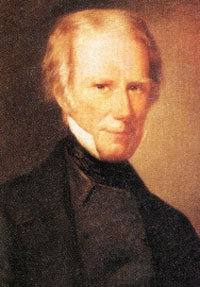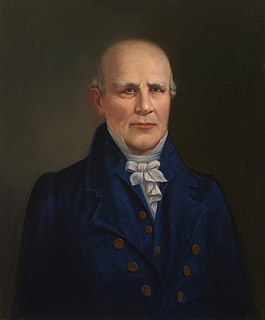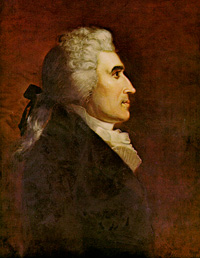| Elections in Maryland | ||||||||
|---|---|---|---|---|---|---|---|---|
 | ||||||||
| ||||||||
| ||||||||
Elections by year | ||||||||
A special election was held in Maryland's 7th congressional district on November 29, 1798, to fill a vacancy left by the death of Representative-election Joshua Seney (DR) before the start of the 6th Congress.
| Elections in Maryland | ||||||||
|---|---|---|---|---|---|---|---|---|
 | ||||||||
| ||||||||
| ||||||||
Elections by year | ||||||||
A special election was held in Maryland's 7th congressional district on November 29, 1798, to fill a vacancy left by the death of Representative-election Joshua Seney (DR) before the start of the 6th Congress.
| Candidate | Party | Votes [1] | Percent |
|---|---|---|---|
| Joseph H. Nicholson | Democratic-Republican | 1,351 | 51.4% |
| John Goldsborough | Federalist | 1,278 | 48.6% |
Nicholson took his seat with the rest of the 6th Congress at the start of the 1st session.

Elections to the United States House of Representatives were held in 1900 for members of the 57th Congress, coinciding with the re-election of President William McKinley.

Elections to the United States House of Representatives for the 37th Congress were held at various dates in different states from August 1860 to October 1861.

In the United States House of Representatives elections in 1828 and 1829, the Jacksonians soundly took control of the presidency, with Andrew Jackson's victory, and greatly increased their majority in Congress. Outgoing President John Quincy Adams's unpopularity played a major role in the Jacksonian pick-up, as did the perception of the Anti-Jacksonian Party as urban and elitist. Major increases in suffrage also heightened Jacksonian wins, as newly enfranchised voters tended to associate with Jacksonian principles. The Anti-Masonic Party, a single issue faction based on distrust of Freemasonry, became the first third party in American history to garner seats in the House.

Elections to the United States House of Representatives for the 17th Congress were held at various dates in different states between July 1820 and August 1821 as President James Monroe won reelection unopposed.

Elections to the United States House of Representatives for the 16th Congress were held at various dates in different states between April 1818 and August 1819 during President James Monroe's first term. Also, newly admitted Alabama elected its first representatives in September 1819.

Elections to the United States House of Representatives for the 15th Congress were held at various dates in different states between April 1816 and August 1817.

Elections to the United States House of Representatives for the 14th Congress were held at various dates in different states between April 1814 and August 1815 during President James Madison's second term.

Elections to the United States House of Representatives for the 12th Congress were held at various dates in different states between April 1810 and August 1811 during President James Madison's first term.

Elections to the United States House of Representatives for the 10th Congress were held at various dates in each state between April 29, 1806 and August 4, 1807 during Thomas Jefferson's second term with the new Congress meeting on October 26, 1807.

Elections to the United States House of Representatives for the 9th Congress were held at various dates in each state between April 24, 1804 and August 5, 1805. The Congress first met on December 2, 1805. The elections occurred at the same time as President Thomas Jefferson's re-election.

Elections to the United States House of Representatives for the 8th Congress were held at various dates in each state, from April 26, 1802 to December 14, 1803 during Thomas Jefferson's first term in office. It was common in the early years of the United Congress for some states to elect representatives to a Congress after it had already convened. In the case of the 8th Congress, the representatives from New Jersey were only elected after its first meeting on October 17, 1803.

Elections to the United States House of Representatives for the 5th Congress took place in the various states took place between August 12, 1796, and October 15, 1797. The first session was convened on May 15, 1797, at the proclamation of the new President of the United States, John Adams. Since Kentucky and Tennessee had not yet voted, they were unrepresented until the second session.

Elections to the United States House of Representatives for the 3rd Congress were held in 1792 and 1793, coinciding with the re-election of George Washington as President. While Washington ran for president as an independent, his followers formed the nation's first organized political party, the Federalist Party, whose members and sympathizers are identified as pro-Administration on this page. In response, followers of Thomas Jefferson and James Madison created the opposition Democratic-Republican Party, who are identified as anti-Administration on this page. The Federalists promoted urbanization, industrialization, mercantilism, centralized government, and a broad interpretation of the United States Constitution. In contrast, Democratic-Republicans supported the ideal of an agrarian republic made up of self-sufficient farmers and small, localized governments with limited power.

Elections to the United States House of Representatives for the 2nd Congress took place in 1790 and 1791, in the middle of President George Washington's first term. While formal political parties still did not exist, coalitions of pro-Washington (pro-Administration) representatives and anti-Administration representatives each gained two seats as a result of the addition of new states to the union. Speaker Frederick Muhlenberg, who had led the Pro-Administrationists in 1789, switched loyalties to the Anti-Administrationists during the tenure of the 1st Congress. He failed to win election to the Speakership as their leader as a result of these elections, and was succeeded by Jonathan Trumbull Jr., who became the 2nd Speaker of the House.

Maryland's 7th congressional district of the United States House of Representatives encompasses just over half of Baltimore City, some sections of Baltimore County, and the majority of Howard County. The district was created following the census of 1790, which gave Maryland one additional representative in the House. It has been drawn as a majority-African American district since 1973. Kweisi Mfume is the current representative, winning a special election on April 28, 2020 to finish the term of Elijah Cummings, who died in October 2019.

A special election was held in Maryland's 7th congressional district on September 27 and October 4, 1806 to fill a vacancy left by the resignation of Joseph H. Nicholson (DR)

A special election was held in Maryland's 7th congressional district to fill a vacancy left by the resignation of John Brown (DR) to accept a position as clerk of the county court of Queen Anne's County. Brown had earlier been re-elected to the 12th Congress, thus, his resignation created vacancies in both the 11th and 12th Congresses. Unusually, a single ballot was used for both vacancies. This was the first of at least three examples of this sort of dual-vacancy being filled with one ballot.

The 1816 special elections for Maryland's 5th congressional district were to fill two separate vacancies. The 5th district was a plural district, with two seats. Both seats were vacated, the first by Representative Nicholas R. Moore (DR) in 1815, before the 14th Congress even met, and the second by Rep. William Pinkney (DR) on April 18, 1816 after being named Minister to Russia.

The 2020 United States House of Representatives elections in Maryland will be held on November 3, 2020, to elect the eight U.S. Representatives from the state of Maryland, one from each of the state's eight congressional districts. The elections will coincide with the 2020 U.S. presidential election, as well as other elections to the House of Representatives, elections to the United States Senate and various state and local elections. On March 17, 2020, Governor Larry Hogan announced that the primary election was being postponed from April 28 to June 2 due to coronavirus concerns. On March 26, the Maryland Board of Elections met to consider if in-person voting should be used for June's regular primary, recommending that voting in June be mail-in only.

A special election was held on April 28, 2020, after a February 4, 2020 primary, to fill the remainder of the term in the United States House of Representatives for Maryland's 7th congressional district in the 116th U.S. Congress. Elijah Cummings, the incumbent representative, died in office on October 17, 2019.
| This Maryland elections-related article is a stub. You can help Wikipedia by expanding it. |